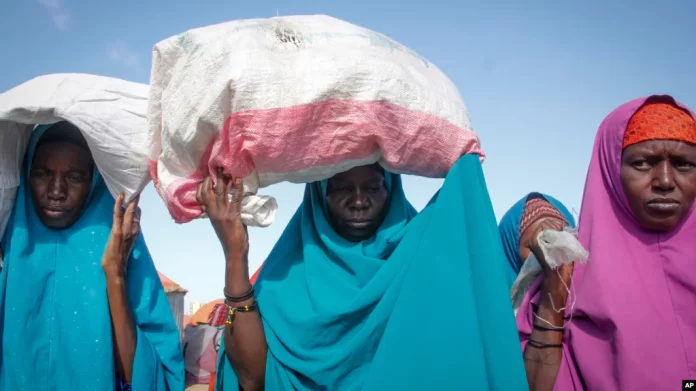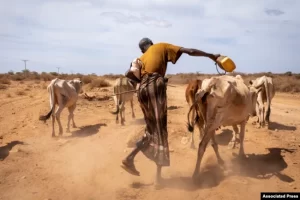GENEVA — The U.N. Children’s fund warns that famine is stalking Somalia, as years of climate-related disasters have destroyed crops, dried up water sources and created an environment in which deadly diseases are flourishing.
Somalia is facing a food, malnutrition, and water crisis after three years of consecutive drought, compounded by heavy flooding, and an infestation of desert locusts. The U.N. Children’s Fund, UNICEF, reports that more than four million people, a quarter of the population, need humanitarian food assistance.
It says 1.4 million children are acutely malnourished, including 330,000 at risk of dying if they do not receive special treatment for severe acute malnutrition.
Additionally, UNICEF’s chief of communication in Somalia, Victor Chinyama, said millions of people need emergency water supplies. Speaking from the capital, Mogadishu, he said lack of water is leading to serious outbreaks of diseases, such as measles, and diarrheal diseases including cholera.
Chinyama said families are taking desperate measures to survive. Since November, he notes half a million people have fled their homes in search of food, water, and grazing land for their cattle, exposing them to many risks. He says children on the move are particularly at risk of multiple abuses.
“Such as sexual violence, exploitation, gender-based violence. And in the context of Somalia, we cannot talk about displacement risks without addressing the specter of children being abducted and recruited by armed groups, for example, such as al-Shabab,” he said.
UNICEF reports last year, 1,200 children, including girls, were recruited by armed groups and 1,000 children were abducted. Chinyama said many of these children have been victims of multiple violations.
He urged the international community to act now to support Somalia and avoid a repeat of the 2011 famine, which killed an estimated quarter-million people.
“When the international community waits until a famine is declared as we learned from 2011, that is probably a bit too late. A lot of the mortality happens before the famine is declared. When we start to show pictures of emaciated children, distended pot bellies, I am afraid that is too late,” said Chinyama.
UNICEF is appealing for $48 million to carry out its humanitarian operation. It says $7 million is urgently needed by March to purchase high energy vitamin fortified food. It says the lives of 100,000 severely acutely malnourished children depend upon receiving this treatment.
Source VOA


